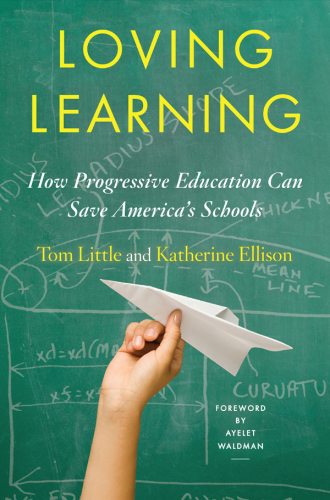
Loving Learning
How Progressive Education Can Save America's Schools
- اطلاعات
- نقد و بررسی
- دیدگاه کاربران
نقد و بررسی

January 12, 2015
Educator Little and Ellison (Buzz) provide a rich overview of the history and methods of the largely abandoned progressive education model, as well as an optimistic vision for its future. Prior to his death in April 2014, Little, a practitioner and advocate for progressive education since 1976 who served as head of school at Park Day School in Oakland, Calif., conducted a tour of 45 progressive schools, which, blended with his own experience, provide the basis for this book. At the heart of the argument is the idea that children will love learning, if teachers recognize and respond to their individual interests. The authors eloquently present the progressive principle of integrated, student-centered learning with examples gleaned from Little’s national tour of progressive schools. Linking current models with the historical underpinnings of progressive education, while openly illuminating the pitfalls and failures of the movement, Little and Ellison provide a comprehensive primer for how and why student-centered learning, combined with dedicated and thorough teaching methods, can create avid and successful learners. Agent: Bonnie Nadell, Hill Nadell Literary Agency.

January 1, 2015
One of the leaders of the progressive education movement reflects on ways to improve more than just standardized test scores. The urgency of this book comes from two directions. The first, most obvious direction is the need for change in our American education system; every semester brings more news of disinterested students and harried teachers struggling to make a difference while guarding their backs against the threat of termination if the test scores don't add up. The second direction is Little's personal fight; diagnosed with bone cancer in the summer of 2013, he felt a new urgency to finish writing what he'd learned. The author died earlier this year, leaving behind his legacy of work at Park Day School in California and in this book, which examines successes and challenges at that school and many others like it. Little traveled around the country, visiting "progressive schools," a loose moniker for schools that structure lessons and the direction of learning based on where the interests of the students take them. Emphasizing critical thinking, open communication and collaboration, and hands-on learning, the model works to prepare students to leave school capable of self-directed learning. With the assistance of Pulitzer Prize winner Ellison, Little explores the different movements forming to protest the government-driven "testing mania," noting that corporate interests have lobbied furiously to convince legislators that using standardized tests to measure student achievement and teacher efficacy has in fact hampered both. Little also writes about the accountability and rigor that critics claim progressive schools lack. When we talk about the ways children learn, it is accepted wisdom that different people learn in different ways, but with standardized testing, we're looking at one small piece of their educations and extrapolating too far. Little's enthusiasm and passion for the potential of progressive schools burn on every page and offer hope for a better way forward.
COPYRIGHT(2015) Kirkus Reviews, ALL RIGHTS RESERVED.

February 1, 2015
With decades of experience at California's Park Day School, which uses progressive techniques to combat many of the problems, including dropouts and bullying, found in traditional public schools, Little (1953-2014) here shares his firsthand experience with coauthor Ellison (The Mommy Brain). What began as an experiment is now a thriving community of parents, students, and teachers engaged in education designed to stimulate a love of learning, strengthen character, and elicit curiosity. Progressive education, as espoused by John Dewey, Johann Heinrich Pestalozzi, and Maria Montessori, among others, is often discounted as too flimsy an approach. However, Little shows that these occasionally misunderstood theories are vibrant and provide a strong foundation for learning. Highlighting some of the basic principles of progressive education, including a focus on the whole child and sensory learning, Little displays though historical connections and modern examples the effectiveness of progressive schools. While the book is short on practical applications, its visionary links between theory and practice are empowering and will be engaging to readers who want to learn more about how these schools get things done. VERDICT For educators who are interested in understanding progressive instruction and how it might be used to solve today's educational dilemmas.--Rachel Wadham, Brigham Young Univ. Libs., Provo, UT
Copyright 2015 Library Journal, LLC Used with permission.

March 1, 2015
Loving Learning is a laudable book, both a compelling call to arms to reignite the tenets and practices of American progressive education and a good read. In this posthumous work, Little, who was the beloved leader of the independent Park Day School in Oakland, California, for nearly three decades, and his coauthor, journalist Ellison, provide a succinct overview of how at the beginning of the twentieth century the U.S. led the way in developing pedagogies that foster what are now considered twenty-first-century skills: critical thinking, problem solving, communication, and collaboration. Little and Ellison offer examples of schools across the nation that remain true to progressive education practices involving interdisciplinary, child-centered teaching and learning experiences (and rejection of excessive standardized testing). The authors don't shy away from enumerating the pitfalls that have plagued the 100-year-old movement. But if the goal of education is to promote active participation in a democratic society, ensure American commitment to social justice, and foster lifelong love of learning, then, Little and Ellison persuasively argue, an embrace of progressive educative principles and methods is the answer.(Reprinted with permission of Booklist, copyright 2015, American Library Association.)




دیدگاه کاربران